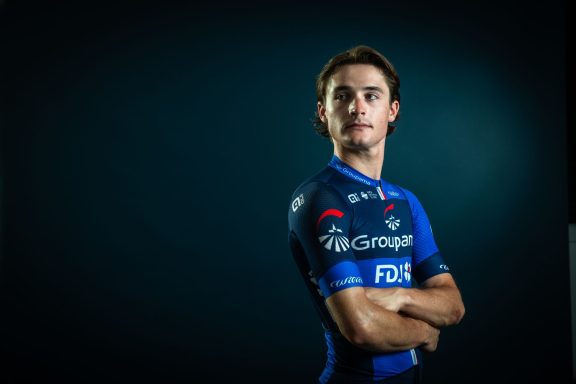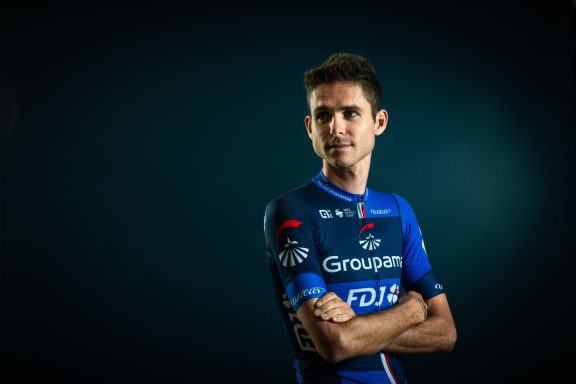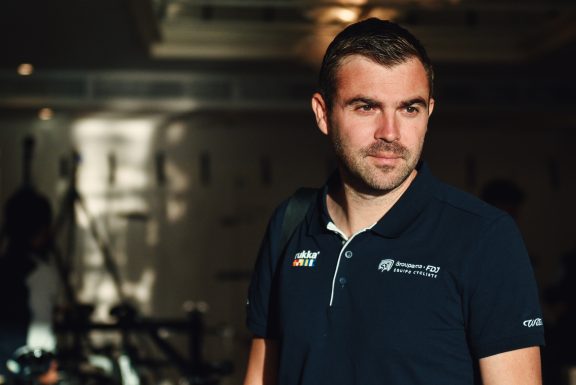After he proved his talent in the juniors category, Lewis Askey was a coveted young man heading into the 2020 season. Many teams, and British Cycling especially, sought to bring him on board, but the young Englishman eventually favoured the Groupama-FDJ continental team, thus joining his West Midlands’ neighbour, Jake Stewart. Like his compatriot, Lewis gave us some of his time for us to get to know him better.
The most informed spectators spotted him as early as a spring day in 2018. A slender, 16-year-old boy, flanked by the Union Jack, celebrated in Roubaix’s velodrome, the Hell of the North’s iconic finish, where he had just won the junior edition. A slightly wider audience discovered him this year in early March, when, with sixty-seven kilometers left to the Samyn finish line, his pushes amongst the pros on the paved climb of La Roquette allowed him to momentarily take the race’s lead. Though the move potentially proved unsuccessful, Lewis Askey gave us an early glimpse of his temperament. “To race is what I love above all,” he insists. “To race” as a child would understand it: to be the fastest from point A to point B. Lewis got a taste for competition from an early age, just after being introduced to cycling, and more specifically to mountain biking, by his parents who are quite sporty themselves. “Ever since I was 3, I was always on a bike,” he says.
A very young ‘all-terrain’ champion
His first real potential, however, shone from the pool. “My nan is a swim coach. I have been swimming since I was a little boy and competed until I was about eleven,” he tells us. His times were promising but he remained unconvinced by the discipline. “I still like to swim for fun, especially in winter, but swimming gets too serious quite young,” he explains. “The equivalent of riding my bike 3 times a week would have been to swim 5-6 times a week. That’s why I stopped. I just preferred not to be putting the hours in going up and down, seeing the floor again and again. I just enjoy racing, and swimming was simply another sport to race in”. Cycling then took over, despite the fact that the native of Cannock, north of Birmingham, continued to do and try other sports. “Realistically, I just rode my bike for fun up to the age of 12”. When he entered the U14 category, his competitive spirit starkly intensified, after his first few experiences in cyclocross racing. “I started to think, ‘Actually, I really want to win this race, and this race, and I’m going to train an extra hour for this one.'”
More dedicated and better supervised, the young Lewis starts to make his mark, but he was far from imagining the performance he would have few months later. At 14 years old, he wins four British championship titles. Four titles… in four different cycling disciplines. A first, perhaps. He is therefore crowned on the road, in mountain biking, in cyclocross and on the track! “That was crazy to me,” he recalls. “I know very well that people say it doesn’t mean much at 14, but I still hold on to that a bit, I’m still proud of that today.” His performance was made possible because track, which is essential in Great Britain, “complemented nicely” with road racing, but also by his desire to ride in the woods in the winter. “If there was an option to race, and do well, why wouldn’t I?” he smiles. Little by little, of course he has to focus on certain disciplines over others, but he continues to prove, among the U16 and the juniors, that his early results were not luck-related. “It was sort of a gradual progression,” he says. “Every time I just managed to step up my game with everyone else’s. At 16, I got some good results and got selected for the British Cycling Academy. Maybe that’s when it all changed. I was picked in the top 5 in the whole of Britain. It meant something to me. That was probably a turning point.”
Breakthrough as a junior and seeking the perfect team
The young man temporarily leaves his island and goes to compete in his first international races on the continent. The first results were not long coming, and after a promising thirteenth place on Ghent-Wevelgem, Lewis Askey makes a splash in Paris-Roubaix. “Raising my arms in the velodrome, with all this crowd, is a feeling that I will never forget. I often think about it, it’s a source of motivation, and maybe that’s what started it all,” he explains. “I’ve never doubted but it’s not that I’ve been overconfident because I never thought, when I was younger, that it was going to be my job. I just took the steps one after the other, without really thinking about the rest.” After Roubaix, he was forced to. Offers poured in and “the ball really started rolling”, he concedes. The attention did not prevent him from continuing to place, quite the opposite, and he earned a silver medal in the British road championship, won the prologue of the Tour Assen (Netherlands) and got second in the demanding ‘Philippe Gilbert juniors’. After this successful season, he still takes time to get back to his first love, cyclocross, and continues to excel. Competing against masters of the sport, in Belgium, he nets four podiums, one of them on a World Cup round, in Heusden-Zolder. He also settles for second place in his national championship behind Ben Tulett, crowned shortly after at the Junior World Championships.
His winter break is only a theoretical break, and he soon gets back on track for his second road season as a junior. “I made it into the top 8 of my first four races in 2019,” he recalls, including Ghent-Wevelgem (2nd), Kuurne-Brussels-Kuurne (6th) and Paris-Roubaix (8th). “I did not even win a race at that time, but I’d be on the podium, I’d been consistent in the start of the season. I think that really helped me have a short at the U23 system and I was not worried about finding a team”. Bolstered by his free spirit, he goes on to pull off strong performances, including a podium on the Tour of Flanders (3rd) but also the overall victory on the Tour of the Isle of Man, dear to Mark Cavendish, as well as on the Tour of Wales, considered as the most prestigious British stage race for juniors. He reinforces his status on the national scene and keeps shining in Belgium (5th in Keizer der Juniores, 6th in Philippe Gilbert). This season of confirmation logically opens many doors to him, and it is that of Groupama-FDJ Conti he decides to plunge into. “I wanted to go to the best place in the world for me,” he says. “It was a long, reflective process and I ended up thinking that Groupama-FDJ was going to be the best place for me. I also like to have a bit of independence, live my own life, enjoy myself, feel like I’m doing things for me, that I’m doing what I need to do. I think with British Cycling, in addition to doing the track, which I’m not a big fan of, I’d be more controlled in what I was able to do. Here, I’ve been allowed to race cyclocross in the winter. That would not have been possible there. Here I can race the races I want to race, the schedule is really really good. I felt like the team was the best place to progress AND be happy in the sport.”
“My heart is on the Classics but I don’t want to exclude anything”
He also acknowledges having had an adviser like no other. “The role of Jake [Stewart] was fundamental in me joining the team,” says Lewis. “He has been through the British Cycling Academy and he has spent a year here. So there was really no better person to ask in my situation than Jake. We talked a lot in private and he was not going to lie. I asked him genuinely what the things were that he absolutely hated and what were the things he absolutely loved about being in Groupama-FDJ. I think, for me being here right now speaking with you shows that the team is working pretty well because, obviously, I wouldn’t be here if Jake hadn’t been happy with the situation. It was 100% sure when I got here that I was going to be happy”. Although the season had to quickly be put on hold, Lewis, who’ll celebrate his 19th birthday in early April, had some time to get an impression of how the organization operates. “So far, I’ve been really impressed with the team,” he said. “The staff are amazing, and everyone works really well together, everyone gets the best out of each other. They give me everything I need to be the best I can be, and mentally, it puts me in a good place. The whole time, I’ve not been worried about anything and felt like I was in the WorldTour. For me there is no difference, that’s also why I think it’s a great place for me to develop. Nutrition, training, massages; nothing is overlooked. You are in a bubble. You are in that mindset of being a professional cyclist.”
He has only been able to enjoy this new status twice in races this year, in the Ster van Zwolle (34th) and the Samyn (54th). Though in both races he was already able to confirm his potential, whether in the Batavian wind or on the Belgian cobblestones. “I don’t know what to expect from this year,” he says. “I don’t know how it is going to feel in U23, what races I can and cannot perform well in. Apart from Roubaix (now cancelled), there was no race that I was really aiming for. Realistically, I want this year to be about learning and developing and getting better as a cyclist.” That being said, his past performances, his fairly strong body type and his affect naturally lead him to the Classics. “I don’t feel like I am powerful enough to be a sprinter, even though I can sprint. I’m probably not light enough and endurance-paced enough to be the best at climbing”, he says. “However, I feel like super all-rounded. I think you can put me on any stage, no matter the profile, I’ll be there, even if I don’t win. I wouldn’t say no to anything right now, but it’s clear that my heart is on the road, and probably on the Classics. I love what they represent and have to offer; horrible weather, rain, wind, echelons, cobbles, crashes… I still have plenty of years to develop. I do not know where I’m going to be, toward more of a (former) Gilbert kind of rider or more of a Flandrian like Sagan. I don’t want to exclude anything until I reach the WorldTour, where you have to be more specific to win races. Until then, I just want to learn more about myself and my body.”
“Living the dream” rather than a frozen burger
In that prospect, he will have to wait for the season to resume. He will then get back to his apartment in Besançon, which he shares with his Italian teammate Mattia Petrucci, and where he has been able to gets his bearings over several weeks, far from his close ones. “I love this part of France, it’s really not a constraint to be in Besançon, far from my family. Also, I’m here from February to October and we move constantly for the races. We also have the opportunity to travel home 3-4 times a year thanks to the team. And then, where would I be if I were not here now? At University. I’d be moving away from home as well, I would be in debt, probably banging my head against the table every night, eating a frozen burger just out of the fridge. That’s what I’d be doing if I weren’t here. Today, I get to have a new experience, live in another country, I pay my rent, I’m learning French…” Even though he confesses that there is work to be done where French is concerned. “I’ve got basic knowledge, and I can ask basic questions if I desperately need to. The other day, I did not know where to put the bins and there were some residents looking at the window… So I managed to speak a little bit of French and understand a little bit to find out that I was actually at the wrong place (smiles). I found out we could get some French lessons this year as well. I’m self-teaching at the moment, but the thing is that the team is almost too good at speaking English. It’s good for me because it is more convenient, but it also means that I need to put myself in hard situations where I have no choice to speak French.”
Back to England during the undetermined break due to the Coronavirus pandemic, Lewis Askey will not have the opportunity to practice Molière’s language in the coming weeks. Neither will he be able to take full advantage of one of his hobbies, photography, from which he first managed to make extra money that he reinvested in more advanced equipment. “I keep doing it when I have free time, or in the off-season, but just for fun. It’s not a strenuous activity and it is something to take my mind off the sport,” which remains his main interest. “When I stop cycling, I keep doing sports, all sports, any sport: running, swimming, squash, tennis, hiking. And even if I do everything I need to do right now, that I’m professional about my work, I don’t feel serious about it because, for me, I’m just doing something I enjoy. I’m living the dream. I’m doing sports for a job. My job is on the one hand to be healthy, and on the other hand to go ride my bike. Which is essentially my hobby”.




No comment